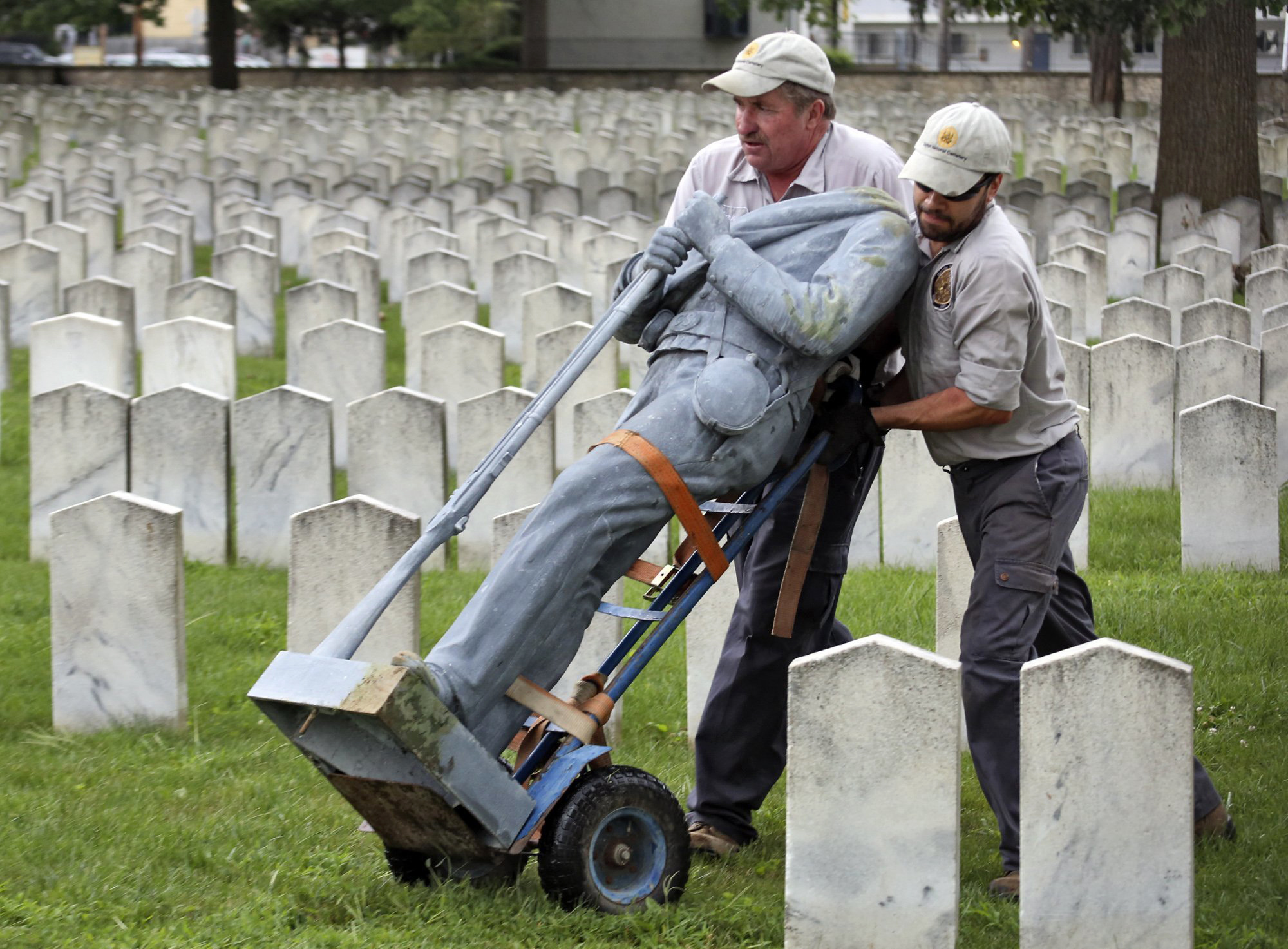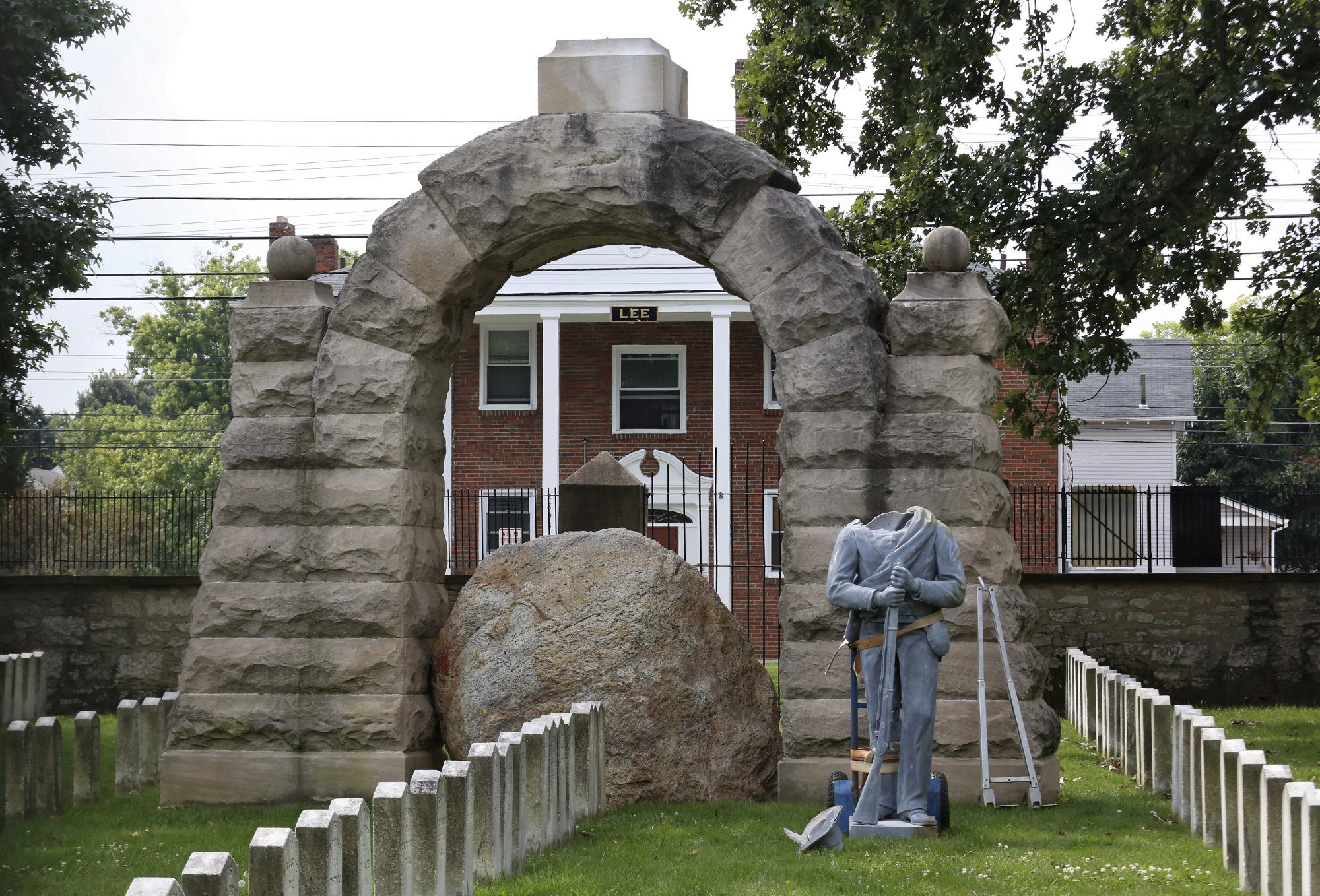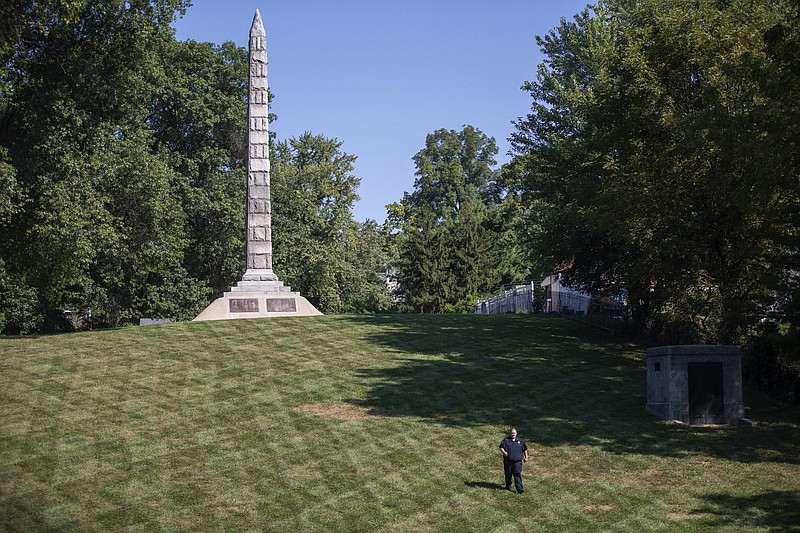ALTON, Ill. - After last year's deadly clash between white nationalists and counter-protesters in Charlottesville, Virginia, the federal government quietly spent millions of dollars to hire private security guards to stand watch over at least eight Confederate cemeteries, documents from the Department of Veterans Affairs show.
The security effort, which runs around the clock at all but one of those VA-operated cemeteries, was aimed at preventing the kind of damage that befell Confederate memorials across the U.S. in the aftermath of the Charlottesville violence.
None of the guarded cemeteries has been vandalized since the security was put in place. Records obtained by The Associated Press through the Freedom of Information Act show that the VA has spent nearly $3 million on the cemetery security since August 2017. Another $1.6 million is budgeted for fiscal 2019 to pay for security at all Confederate monuments, which could include other sites. The agency has not determined when the security will cease.
 In this Aug. 22, 2017, photo, Bert Cambron, left, and Mark Wilson, employees of Dayton National Cemetery, move the vandalized Civil War Confederate soldier statue that stood in Camp Chase Confederate Cemetery in Columbus, Ohio. Two days later, the VA contracted with the Westmoreland Protection Agency, based in Sunrise, Fla., to provide unarmed security guards at Camp Chase and two other cemeteries. After last year's deadly clash between white nationalists and counter-protesters in Charlottesville, Va., the federal government quietly spent millions of dollars to hire private security guards to stand watch over several Confederate cemeteries, documents from the Department of Veterans Affairs show. (Eric Albrecht/The Columbus Dispatch via AP)
In this Aug. 22, 2017, photo, Bert Cambron, left, and Mark Wilson, employees of Dayton National Cemetery, move the vandalized Civil War Confederate soldier statue that stood in Camp Chase Confederate Cemetery in Columbus, Ohio. Two days later, the VA contracted with the Westmoreland Protection Agency, based in Sunrise, Fla., to provide unarmed security guards at Camp Chase and two other cemeteries. After last year's deadly clash between white nationalists and counter-protesters in Charlottesville, Va., the federal government quietly spent millions of dollars to hire private security guards to stand watch over several Confederate cemeteries, documents from the Department of Veterans Affairs show. (Eric Albrecht/The Columbus Dispatch via AP)Private security was needed "to ensure the safety of staff, property and visitors paying respect to those interred," Jessica Schiefer, spokeswoman for the VA's National Cemetery Administration, said in a statement. The agency "has a responsibility to protect the federal property it administers and will continue to monitor and assess the need for enhanced security going forward."
Most of the protected cemeteries are in the North, in places far removed from the Confederacy. Vast numbers of the buried soldiers were prisoners of war who were held nearby. Many succumbed to smallpox and other diseases. The cemetery monuments are typically simple and solemn, serving more to acknowledge the deceased than to celebrate the slaveholding nation they defended.
Government watchdog groups and some members of Congress question if the spending is still necessary. Steve Ellis, executive vice president of the non- partisan Taxpayers for Common Sense, said the cost of security represents the sort of "spending inertia" too common in government.
"Unfortunately what happens with the government is once you start spending money on something, you generally continue to spend money on it," Ellis said.
Jeff LaRe, executive vice president of The Whitestone Group, said an uptick in vandalism of Confederate monuments this past summer was evidence that cemetery security remains necessary. Protesters in August toppled a century- old statue at the University of North Carolina, and vandals put paint on statues in Salisbury, North Carolina, and Richmond, Virginia.
 In this Aug. 22, 2017, photo, the vandalized Civil War Confederate soldier statue that stood in Camp Chase Confederate Cemetery in Columbus, Ohio, waits to be moved into safekeeping. Two days later, the VA contracted with the Westmoreland Protection Agency, based in Sunrise, Fla., to provide unarmed security guards at Camp Chase and two other cemeteries. After last year's deadly clash between white nationalists and counter-protesters in Charlottesville, Va., the federal government quietly spent millions of dollars to hire private security guards to stand watch over several Confederate cemeteries, documents from the Department of Veterans Affairs show. (Eric Albrecht/The Columbus Dispatch via AP)
In this Aug. 22, 2017, photo, the vandalized Civil War Confederate soldier statue that stood in Camp Chase Confederate Cemetery in Columbus, Ohio, waits to be moved into safekeeping. Two days later, the VA contracted with the Westmoreland Protection Agency, based in Sunrise, Fla., to provide unarmed security guards at Camp Chase and two other cemeteries. After last year's deadly clash between white nationalists and counter-protesters in Charlottesville, Va., the federal government quietly spent millions of dollars to hire private security guards to stand watch over several Confederate cemeteries, documents from the Department of Veterans Affairs show. (Eric Albrecht/The Columbus Dispatch via AP)Darrell Maples, a Missouri-based commander for the Sons of Confederate Veterans, agreed.
"I don't think it's going to go away anytime soon," Maples said.
Whether because of the added security or other reasons, no vandalism has occurred at any of the cemeteries since the August 2017 incident in Springfield, the VA said.
Protesters gathered at Confederate Mound in Chicago in April, at the same time the Sons of Confederate Veterans rallied there. But amid a heavy police presence, nothing was damaged. Schiefer said that twice in September 2017, suspicious vehicles were spotted near the statue at the Elmira cemetery but drove away when the guard approached.
